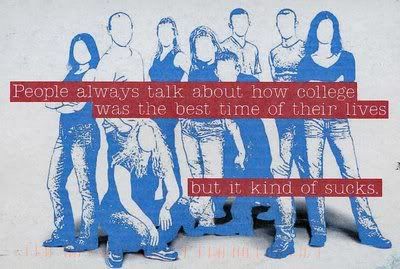Damn, I’m certainly on a crusade against humor these days.
That was sarcasm, by the way. I love humor. I just think it should be deployed carefully.
A few days ago in my Psychology of Personality class, the following happened:
Some people were having their own conversations while the professor was trying to give a lecture. The professor cracked a joke–“Hey guys, I have ADD so I can’t focus if other people are talking, so please stop!” followed by “I don’t really have ADD, but still.”
Now, for the record, I totally get that it sucks for a teacher when people are talking in class. But I also feel that there are other ways to address that situation without making a joke about having a mental illness that you don’t actually have. Especially, you know, if you’re a person who has a PhD in psychology and conducts research on people with actual mental illnesses.
The sad thing is, before he followed his comment up with that disclaimer, I was actually really touched. I thought it was wonderful that a professor of psychology would take a stand against the stigma of mental illness by stating in class that he has one. But then, you know, it turned out to just be a joke.
~~~
Last spring, I took a class on Cognitive Behavioral Therapy. It was an advanced class, with just around ten students or so, taught by one of the most esteemed professors in the department. We got to the chapter on Borderline Personality Disorder, which, as you may know, is considered one of the most frustrating mental disorders–both for clinicians and for the patient’s friends and family. So naturally, no discussion of it could be complete without my professor’s bombastic explanations about how she tries to avoid treating BPD patients because they’re just SUCH a pain and about how she once had a friend with BPD who was just SO hard to deal with. Everyone gasped and laughed at her descriptions.
Then, of course, the other students had to start raising their hands and talking about their own friends that they’d taken the liberty of diagnosing with BPD, and how horrific those people were.
This was a time in my life when I was seriously wondering if I had BPD myself, so, yeah, that was pretty unpleasant.
~~~
Last fall, I took a class on psychopathology. It was my second psychology course ever, and my first that related specifically to mental disorders–a topic very close to my heart at the time since I’d been diagnosed with major depression only a month before.
Before the course started, the professor sent out an anonymous survey to the entire class about our experiences with mental illness. On the first day of class, she disclosed the stunning results–more than half of us said we’d been diagnosed with one.
So we got to the chapter on depression and the professor started talking about depressive cognitive distortions, using specific examples. The professor started listing them off in such a way that the whole class started laughing. And laughing, and laughing.
Now, I totally get that it sounds funny. Consider this dialogue:
X: I’m getting a B in calculus. I’m a total failure.
Y: You’re not a failure at all! You have straight As in the rest of your classes.
X: Well, those don’t count. They’re easy anyway.
Y: Yes, and calculus is pretty hard, so it makes sense that you wouldn’t do as well. Besides, a B is a pretty good grade.
X: No, it’s a shitty grade. Everything I do is shitty and I’m always going to be a failure.
That is an example of several cognitive distortions, including overgeneralization, disqualifying the positive, magnification, and labeling. And, when read aloud in a particular tone of voice, I can see how it might sound kind of funny.
But having been through it myself and studied it extensively, I can also hear the pain behind what X is saying. It’s not a punchline. It’s a cry for help from a person trapped inside their malfunctioning mind.
~~~
Here’s the thing. I get it. People with PhDs in psychology have spent years and years reading, writing, and talking about stuff like this. I’m sure that it’s completely normal for two psychologists to crack jokes about mental illness to each other.
Knowing that many people who pursue degrees in psychology are spurred to do so by their own experiences with mental illness (I’m an example of this), I understand the urge to joke about it because I joke about it myself. It helps alleviate the fear and pain of living with mental illness.
That doesn’t mean I’d joke about it to a room full of 100 people who don’t know me well and who may be dealing with their own issues, though.
Case in point–at the time I took the aforementioned psychopathology class, I was still learning how to recognize cognitive distortions in myself, and I was beginning to realize the extent to which they’d ruined all of my previous interactions, friendships, and relationships. To have a room full of 100 people laughing uproariously about something that nearly brought you to suicide just three short months before is, well, no laughing matter.
~~~
I’m not saying there’s no room for humor about mental illness. There definitely is, and humor has been one of several strategies that have helped me process what happened to me. But humor must be used carefully.
I’ve written before about the complex relationship between humor and mental illness–here, here, here, here, and here. But this time, the situation is very different because the off-color jokes are coming not from comedians, television writers, novelists, or clueless friends of mine, but from people who know more about psychology than 99% of the population.
Unfortunately, I still haven’t quite worked up the courage to tell a person with a PhD that they’ve offended me.
But I’m working on it.





